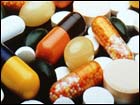|
Clarinex to come cheaper
|
 |
December 26, 2001: 2:52 p.m. ET
Schering-Plough to sell heir to allergy drug Claritin 18% cheaper than original.
|
NEW YORK (CNN/Money) - Schering-Plough Corp. said Wednesday it will sell its new allergy drug Clarinex to wholesalers nearly 18 percent cheaper than its original blockbuster Claritin, a move that could encourage patients to switch to the new treatment.
A Schering-Plough spokesman said Clarinex will sell for $1.83 per pill, down from the $2.22 it charges for Claritin.
Schering-Plough (SGP: down $0.93 to $36.18, Research, Estimates) announced last week that Clarinex received approval from the U.S. Food and drug administration and is expected to be launched in January.
The discount for Clarinex, compared with Claritin, is deeper than the 5 to 15 percent range that had been predicted by many Wall Street analysts.
Analysts have said such discounts would be necessary to woo patients to Clarinex from Claritin before December 2002, when Claritin's U.S. monopoly is set to expire -- thereby ushering in a possible flood of cheaper copycat medicines.
Len Yaffe, a Banc of America Securities analyst, said he had been counting on Clarinex to cost 10 to 15 percent less than Claritin.
"The actual discount will be a bit higher than that, which will mean less revenue growth for Schering-Plough in the short term because every prescription written for Clarinex will cost less than expected," Yaffe said.
The steep discount could prove beneficial over the longer term, however, because it will speed up recruitment of Claritin users to Clarinex, Yaffe added.
But Yaffe said Clarinex does not appear to offer any real advantages over Claritin, based on clinical data, a shortcoming which could prevent both drugs from competing successfully with generic forms of Claritin that could cost 50 to 80 percent less than Schering-Plough's products.
O'Donnell declined to spell out any advantages Clarinex may offer over Claritin, citing competitive reasons.
Claritin is seen having U.S. sales this year of about $1.8 billion, which Yaffe said amounts to 23 percent of the company's total projected global pharmaceutical sales. 
|
|
|
|
|
|

|

